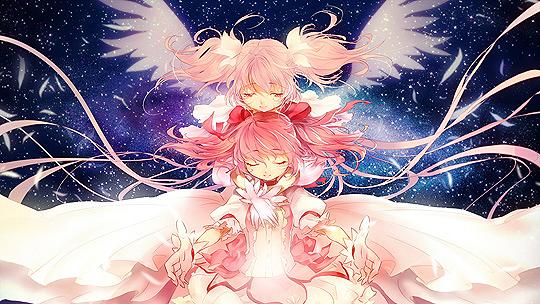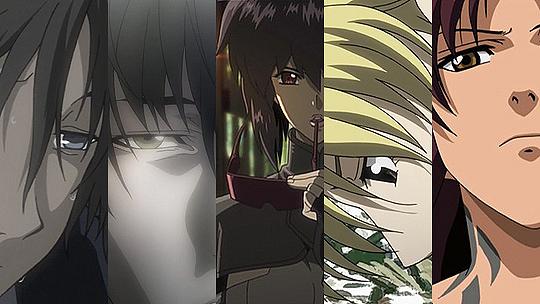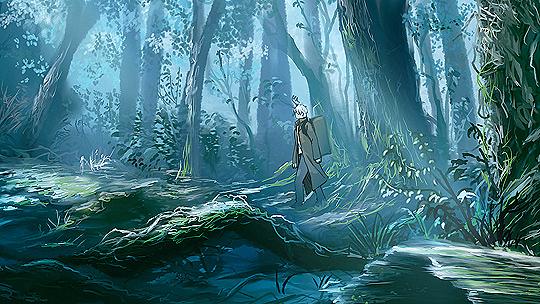I'm on a quest to understand exactly why I like the anime that I do. It's relatively easy to enumerate which ones I like more than others, MyAnimeList exists more-or-less exactly for this purpose, but that doesn't really explore what makes a show excellent beyond an attempt to pattern-match (studio, release year etc.) or to compare with others to find compatibility and recommendations.
That is when protagonists have any personality at all. The one-male many-female "harem" setup is often an excuse to parade an empty husk around as a central lead - all the better for imprinting one's own ideals upon them, like a baby-bird with its mother, all-the-while guaranteeing the character's limp-wristed ditherings are incapable of offending potential viewers. The arrangement is not to blame though, a wish-fulfilment fantasy it may be, but when you have stand-out performers such as Toradora! or School Days - the former distilling to potent purity and the latter perverts into harrowing drama - the laziness in recent tripe-markets such as Infinte Stratos and Princess Lover becomes more apparent.
A keen observer would spot that all of these take place when the characters are in adolescence, usually the 14-17 range. It's no coincidence: the strong belief of the creators that high-school is the halcyon days of one's life; but it largely cripples the possibilities of protagonists to transcend caricatures and become characters, or even fully-formed people. Personalities are almost constantly in flux during this period of one's life and gluing on fantastic abilities or testing them with melodrama doesn't produce the best results. The most natural of processes at that age - growth - is often omitted despite its ability to turn stagnation into story, a snapshot into a journey. To swap media for a moment, look at Harry Potter or the His Dark Materials trilogy by Phillip Pullman for evidence.

image by たま
A school setting does not preclude great protagonists, Stellvia of the Universe, Full Metal Panic or the recent Madoka demonstrate as such, but again the laziness in the writing of other shows makes them stand out all the more. Great protagonists demand strong writing but a balance is always of paramount importance. Characterisation without story leads to dramas like Onegai Twins, Welcome to the NHK, Genshiken or Kimi ga Nozomu Eien which, for better or worse, live and die by their characters. The other side of the conundrum leads to a solid plot but bland characters typified by recent Gundam efforts but seen equally in epics such as Heroic Age and Hack Sign, other media are of course just as prone: take a bow Final Fantasy 12.
Balance too then in the composition of protagonists within a show? The one-boy many-girls structure championed by so many can be augmented: many-girls one-boy shows such as My-HiME or Claymore, or by introducing some gender-switching with Kasimasi, Kämpfer or Ranma 1/2. Favouring a one-gender approach is similarly risky and leads to issues of contrast, the all-girl pep-squads of Ikkitousen or Queen's Blade to the testosterone overdrive of RAINBOW or Fist of the North Star mean that perspective (and often clothing) is lost.
Writing and balance then, key components to the perfect protagonist? Perfection becomes their biggest flaw, without quirks and quiddities tedium quickly springs. It's here though that the rub is greatest, when every show is engaged in trench warfare for attention, purposely marring a character would seem like the opening bars to a funeral march - how else could the marketing factories operate without the burgeoning affection for characters through their fantasy perfection? "Moé" I believe the term is.
There is no perfect protagonist. They may wear their literary genesis on their sleeve such as with Oba from Aoi Bungaku or they may play the long-game, capitalising on the serial nature such as with Akito in Nadesico or Guts in Berserk but they all grow and change and err and triumph and live and, whether in canon (Rurouni Kenshin) or not, die. They range from the teenage Ayato in RahXephon, the late twenties salaryman Rock from Black Lagoon to the older Batou and Togusa from Ghost in the Shell. They are female, Riza from Full Metal Alchemist, male, Ginko from Mushishi, or androgynous, Motoko from Ghost in the Shell. Gay, straight or undefined, the only characteristic that ties them all together is their difference from the ordinary.
Fundamentally that is the "perfect" protagonist, not always someone I want to be, not always someone I'd like to spend time with, but someone who I want to find out about and travel with them as they develop, whether finding interest in the mundane or levity in the absurd. It's frequently hard to imagine that protagonists in some flavours of show were once like that. Pick your poison: harem, mecha, shounen, slice-of-life, any of the monikers now used to summarise shows in a single breath, now even they have become ordinary, commoditised. Few and far between are the protagonists who can make us hate like Minmay from Macross: Do You Remember Love, make us disgusted like Makoto from School Days, or even cry with joy like Akari from Aria.
It seems such a slight thing to ask for good protagonists, I'd even settle for decent ones, but with so much dross both historically and on the horizon, how does one even begin to filter without quiet patience and the sieve of retrospect?

